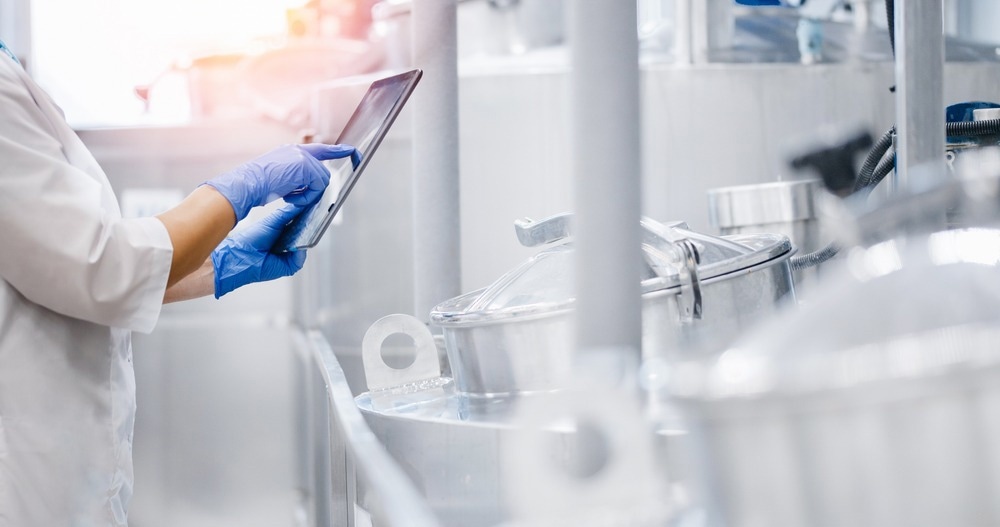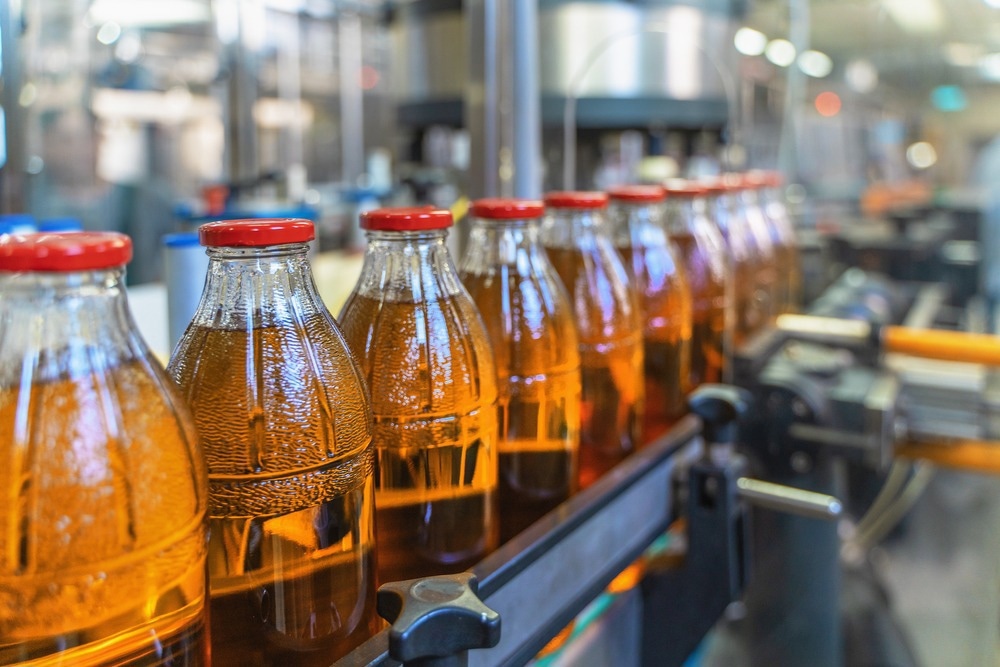To ensure that water supplies remain safe and hygienic and avoid critical issues that could cause harm to human health, beverage companies must perform regular water quality testing. This article will explore this subject and the use of sensors in water quality testing in the industry.

Image Credit: Parilov/Shutterstock.com
Water: A Key Ingredient in Beverage Manufacturing
Water is a key element of the beverage production process. It is crucial for maintaining hygienic operations and steam generation, as well as being a main ingredient in beverage products for commercial sale.
As a utility medium for maintaining both efficient and safe operation, alongside its essential active ingredient status, the crucial role of water makes its safe and hygienic supply a key concern in the beverage industry.
Supplying Safe Water
Producers may assume that the municipal water supply is safe to use in the production chain, but this water supply may be contaminated with a wide range of substances. Low-quality water can contain organic contaminants as well as heavy metals such as lead and other inorganic substances and chemicals.
While municipal water quality, monitoring, and analysis fall under the auspice of the National Sanitation Foundation in the US and other comparable public bodies in the rest of the world, it is the responsibility of beverage manufacturers to regularly monitor and analyze water quality from when it enters a plant to its discharge.
How Does Water Quality Affect Products?
Low-quality water can cause issues such as bad taste in beverage products, potential contamination and health issues in consumers, such as waterborne microbial illnesses and lead poisoning; this can lead to severe financial penalties for manufacturers.
There are multiple issues that need to be resolved before the plant’s water supply can be safely used, especially as an ingredient or for sanitation uses such as washing packaging. For instance, if a city’s water supply is used for beverage manufacture, it must be dechlorinated before use.
When multiple production facilities are used, the consistency of water supply must be ensured to produce products consistent in quality and flavor profiles. Water supply may differ between facilities regarding factors such as mineral content. Moreover, low-quality water supplies can damage crucial equipment.
Discharged water must also meet specific quality parameters to ensure that it does not cause environmental damage. Heavy metal ions, industrial chemicals, and microbial contaminants must be removed before discharge.
The Use of Sensors in Water Quality Testing for the Industry
Constant monitoring of water supplies and their use during the production process requires beverage companies to use multiple technologies. Due to the critical nature of water quality testing and monitoring, many production facilities have on-site laboratories where analysis is conducted.
Companies use many different types of water quality monitoring equipment. Manual water quality testing methods can be time-consuming, expensive, and suffer from unacceptable degrees of inaccuracy. Increasingly, the industry is turning to innovative sensor-based technologies.
Different sensor types can be utilized, providing essential, real-time monitoring capabilities and data harvesting. Both conventional and nanotechnology-based sensors, and sensors with IoT capabilities, have seen increasing use in the industry in recent decades.
Sensors are used to monitor critical water quality parameters such as pH, inorganic ion concentration, total dissolved salts, temperature, biological oxygen density, chemical oxygen density, and levels of biological contaminants.
Conductivity sensors can be employed to precisely control cleaning processes, improving safety and reducing costs. Wastewater which has been used for operational applications and as an ingredient, is routinely monitored for contaminants using sensors that detect biological organisms, organic compounds, and inorganic ions.

Image Credit: DedMityay/Shutterstock.com
Commercially Available Sensors
There are several commercially available sensors for use in the beverage industry for this key application. These sensors are also widely used in other sectors of the food industry, providing efficient and reliable real-time monitoring and analytical solutions for companies, ensuring the optimal quality of products.
NALCO Water’s 3D TRASARTM technology offers smart sensor solutions to the beverage and food industries. Their product range helps to reduce energy, water consumption, improves the quality of end products, and minimizes environmental contaminant release.
Baumer UK provides a range of process sensors that help beverage and brewing companies efficiently monitor water quality and ensure manufacturing plants' safe and hygienic operation.
Baumer’s process sensors and range of products allow for the full automation of process technologies. Manufacturers can continually assess vital parameters such as flow, pressure, temperature, and liquid and granular media, with automation capabilities ensuring the quality and consistency of products.
The company’s CombiLyz conductivity sensor is ideally suited to monitoring clean-in-place processes and can monitor key factors such as the concentration of cleaning agents, ensuring safe cleaning processes which do not affect product quality.
Mettler Toledo offers dissolved oxygen sensors that can be used in the beverage industry. These integrated sensor-based technologies offer optical and polarographic capabilities to monitor key water quality parameters, operating in typical temperature ranges encountered in the beverage production process.
In Summary
This article has been an overview of the importance of water quality testing in the beverage industry as well as a brief exploration of the role of sensors and some commercially available options for beverage manufacturers.
In recent decades, innovative advances in sensor-based technologies and related technologies such as IoT have enabled companies to vastly improve their monitoring and analytical capabilities. Due to the crucial nature of water quality testing for the industry, the use of sensor technologies will likely accelerate in the coming years.
References and Further Reading
Schug, D (2023) How food and beverage makers can better monitor water quality [online] foodengineeringmag.com. Available at: https://www.foodengineeringmag.com/articles/96344-how-food-and-beverage-makers-can-better-monitor-water-quality
New Food (2012) Ensuring water quality in food processing [online] newfoodmagazine.com. Available at: https://www.newfoodmagazine.com/article/7026/ensuring-water-quality-in-food-processing/
Ecolab (website) 3D TRASAR™ Technology for Cooling Water [online] ecolab.com. Available at: https://www.ecolab.com/nalco-water/offerings/3d-trasar-technology-for-cooling-water
Process Industry Forum (website) Sensor solutions for the beverage and brewing industry [online] Available at: https://www.processindustryforum.com/article/sensor-solutions-for-the-beverage-and-brewing-industry
Disclaimer: The views expressed here are those of the author expressed in their private capacity and do not necessarily represent the views of AZoM.com Limited T/A AZoNetwork the owner and operator of this website. This disclaimer forms part of the Terms and conditions of use of this website.